Gearing up for the release of Episode VIII: The Last Jedi this winter, contributors Ian, Gretchen, and Zach decided to rewatch the entire franchise over the course of this year. We begin Star Wars at the (sort of) beginning with a rewatch of Episode I: The Phantom Menace. All of our expectations were pretty low since the last time we watched this film, but surprisingly it wasn’t quite as bad as we remember.
Mostly.
What were your feelings on the movie going in?
Gretchen: I had low expectations. The first time I watched it, I was vaguely disappointed. In the years since, I’ve become ambivalent about the prequel series. I’ve read some great analysis pieces in the interim that provide more depth than I think Lucas gave them and gave me a new appreciation for them. At the same time, these same pieces gave me insight into what they could have been, so I expected to be disappointed with what I got.
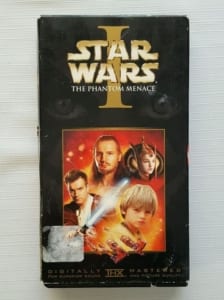
Ian: I too had pretty low expectations. There are a number of different watch orders in existence on the interweb. One says you should watch IV, then V, then II and III like a flashback, and then VI, and omit I altogether (the machete order). I have tried this, and think it works (which is a conversation for another day) but the point is, Episode I is nonessential to the rest of the films.
Anyways, yeah, I wasn’t thinking much of it going in. It’s a “throwaway” story, and was made for kids.
Zach: If we are being honest, I do not remember the first time I watched The Phantom Menace. This is probably because it was so bland and forgettable that I never bothered to remember it. The movie had a lot to live up to, and it would have taken a masterwork of cinema to reach those lofty goals. At the same time, TPM wanted to achieve a whole lot. It needed to introduce all the characters, establish a setting, set the conflict in motion, things like that. Movies have achieved this in the past, but TPM suffers from a critical overload of content. Too many characters, too much world building, and not enough time to develop any of them.
In the end, the movie on the whole is so divorced from the rest of the series in terms of story that one can afford to skip it completely in a rewatch. I only watched TPM for pleasure once, and that was when it was rereleased in 3D. I only watched it again during my marathon in preparation for The Force Awakens and for this article.
What did you think of the characters?
Gretchen: Right off the bat, the Neimoidians made me really uncomfortable with their racist undertones. That only got worse with Jar Jar and the Gungans. And then Watto…Just yikes all around.
Ian: Yeah, the Trade Federation. I don’t even really know what these guys are about. Racist undertones aside, I don’t even get what’s in this for them. Is Palpatine paying them? Do they have a dog in this fight at all? It’s almost like they are there for comic relief, but then other times they are supposed to be threatening. I don’t get it.
Zach: Yeah, the subtle racism of the OT gets cranked up to eleven in TPM. *cracks knuckles* OK, so according to the EU (is this allowed? Is citing the EU a foul?) the Trade Federation, along with the rest of the galactic Outer Rim, is heavily taxed and exploited by the galactic core worlds like Coruscant and Alderaan (who’da thunk?) so they have linked up with Sidious (who they do not know is Palps) because he has promised them that through his influence he can get them a more favorable deal in the Senate. Their dog in the fight is actually a botched attempt at proper representation in the Senate.
Ian: The EU is all “Legends” now, Zach, what are you thinking, gawd…
Gretchen: I liked Padmé a heck of a lot more the second time around. Maybe because of all those analyses I read? It also helped that I knew she was 14 years old this time, which I didn’t know the first time. Her actions and behavior make more sense knowing she’s that young. I have more patience for her pouty jibes at Qui-Gon and infinitely more respect for her poise and political acumen. That senate scene where she stands up to the Neimoidians? Her efficient and strategic battlefield capabilities? Amazing for a 14 year old.
Ian: I feel like the strongest character we get is Qui-Gon. He’s present for most of the movie, but unfortunately, not much of what he does makes sense. The way he mind-tricks his way off of Tatooine was so convoluted. If he’s already unprincipled enough to make Watto take credits, then why not take your credits to some other dealer that’s not magically immune to mind tricks and get money from him? Also, he and Obi-Wan should be charged with child endangerment for taking Anakin into a war zone.
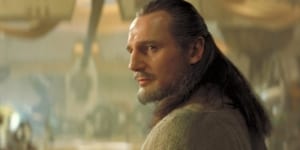
Gretchen: It needs to be said, the Jedi are kind of a bunch of jerks. The Jedi council is far more concerned with ‘peace’ than justice and are willing to allow slavery to exist in the galaxy rather than go up against the Hutt cartel. Qui-Gon casually throws around his mind control like it’s not deeply problematic to take away someone’s free will. And how is it beneficial or helpful to leave the most powerful force-sensitive child they’ve ever seen untrained? You’d think they’d want to train Anakin if nothing else than so that he doesn’t hurt anyone. I’m not sure I’m supposed to feel conflicted about how ‘good’ the Jedi are right now, but I am.
Ian: They don’t really seem good at all. They are concerned enough with “that weird force sensitive thing” Qui-Gon fought (Darth Maul) to send them back to Naboo, but not concerned enough to send more than two guys. Yet they all show up for the party at the end. Like, what even are Jedi?
Zach: For the crap we give to the writing and acting, George Lucas has some stunning themes laced into his work. The Jedi represent a corrupted entity, willing to violate its own principles in exchange for peace and “serving the Republic.” Rather than sending political emissaries to negotiate with the Trade Federation, who might have legitimate grievances against the Republic, the Senate sends two Jedi to bully and force an agreement by any means necessary. Even “maverick” Jedi have no moral qualms about aiding the colonial human Naboo who have forced the native Gungans to live in hiding (yes, the humans of this planet are called “the Naboo.” They probably renamed the thing after they stole it). Gretchen hit the nail on the head: the Jedi care more about peace than justice.
In the same way, this is the reason that the Jedi are so apprehensive about training Anakin. If he is more strong with the Force than Yoda, if he decided to shake things up no one could stop him. He is too old to be indoctrinated to becoming a blind follower and he has seen too much injustice to just passively sit by and allow injustice to continue for the sake of peace.
As for Ian’s question, “what even are the Jedi,” according to the EU they were originally a cult of force-worshippers from the Deep Galactic Core. Originally they were just mystics and did their own thing, but they joined the Republic as peace-keepers 25,000 years before the start of the original series. The Sith are actually a splinter group of exiled Jedi. So yeah, their whole arc is corruption and the side effects of having a state religion.
Ian: So they are pretty much space hippies. That explains a lot, I guess.
Gretchen: That makes a lot of sense.
Speaking of the Jedi, this time around, I had a greater appreciation for how they’re building Anakin’s character already. We see flashes of anger, a deep emotional attachment to his mother, and a hatred for slavery and distrust of those who would allow it to exist. They may not follow through consistently, but they’ve planted seeds.
Zach: See, that is something that they really should have pushed. The scene where Anakin is forced to choose between his mother and freedom should have been a heart-wrenching scene. We should know how much this hurts him, we should have seen how much they cared about each other beforehand. Instead, the story is too concerned with politics and pod-racing. Shmi barely gets any screentime, and the scant time she does get is seldom spent with Anakin.
Ian: A lot of the problems I had with Anakin aren’t with the writing, they are with trying to get a nuanced performance out of a poor child actor who’s in over his head. I feel for Jake Lloyd. It’s not his fault, it’s the casting director. They either needed a better kid actor, or they needed to age him up a bit, maybe get a 12-13 year old. Any of the kids from Stranger Things could have pulled this off.
Zach: It is more than just Jake Lloyd’s acting; it is a complete lack of material that we would need to see so that we could sympathize with the character. Even bad acting can be somewhat salvaged by good writing.
Gretchen: Shmi Skywalker gives me so many feels.
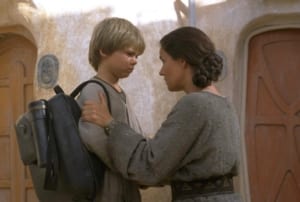
Zach: I’m a momma’s boy, I will freely admit it, so I project a lot of myself onto Anakin in that regard. When I was growing up, even when we did not have much and even when my mother worked, she always made sure that I knew I was loved and she was always honest with me. I see so much of that in Shmi. The tender way she handles Anakin, the care-worn smile on her face. The most tragic thing is how much she gives up so that her son might have a better life. She knows she will never see him again; how often does a Jedi come to Tatooine, much less speak with a slave? However, she knows he will grow up free in a way that she did not, and when her son is in doubt she tells him to go. I can gush more about Shmi when we do Attack of the Clones.
Ian: See, I did not get any of that at all, which I think speaks to how badly this script fumbles the ball. (Sorry, sports metaphor)
Whose story is this? (who is the main character?)
Gretchen: I have a hard time with this, honestly. It’s not really Anakin’s story, he doesn’t have an arc other than ‘he has some powers, does some cool stuff, is amazing, and gets freed’. Qui-Gon likewise doesn’t grow or change. He’s the Wise, All-Knowing mentor who does what’s right (except for casually throwing around mind control) and dies. You could make a case for Padmé, since she does have an arc of fighting for her people, becoming disillusioned with politics, and then triumphing.
Ian: I honestly don’t know. Qui-Gon is there for most of it, but he doesn’t really arc. He just kind of does what he does. A lot of it is about the Naboo situation, and Padmé seems to have the most to lose here, but she doesn’t really do much until they go back to Naboo for the third act. Maybe Obi-Wan? He kind of arcs?
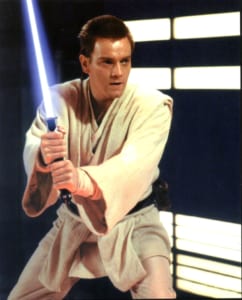
Gretchen: Yeah, he has the strongest arc to me. He starts the film cynical about his mentor’s methods and choices. He doesn’t want to do anything more than what the Jedi Council has asked of him, especially when it comes to Anakin. He’s proud, snide, and fairly self-important. He ends the film a changed person, his mentor’s death having taught him the value of helping others and the need for alternative methods than the ones the Council sets forth. So, for me, I’d say this is Obi-Wan’s story.
Ian: I think I’d have to agree with you there. It’s certainly not Jar-Jar’s. (Yes, I went there.)
Zach: It was everyone’s story, and that is why it was such a bad movie. Everyone had to have their own plot. We had Padmé’s arc as queen of Naboo with all that entails, Qui-Gon got three arcs about grinding against the Jedi, discovering the Sith, and pushing Obi-Wan aside to train Anakin, Jar-Jar had an arc about becoming a hero, the whole GALAXY got its own arc about what it was and how the Republic works, Anakin had his own weird half-baked coming of age story, it was too much.
What worked for you?
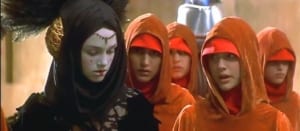
Gretchen: The queens and handmaids of Naboo are so badass. I need all the Handmaiden backstories histories of the other queens of Naboo. Can someone make this a comic book series? I will pay lots of money to read every single one of them.
Zach: Padmé is my favorite thing to come out of the PT. She is so wonderfully selfless.
Gretchen: I love a good ‘secret queen’ story. I headcanon that Qui-Gon knew all along that Padmé was Queen Amidala and enjoyed defying her to her face with this subtle warning like “what are you going to do about it since no one knows who you really are?”.
Zach: In EU sources, the novelization I think, it is revealed that Qui-Gon did know.
Gretchen: Nice! Headcanon confirmed. The dynamic between Qui-Gon’s defiance and Obi-Wan’s caution works really well, too. Obi-Wan is well on his way to becoming the king of sass, even if I don’t like his ‘pathetic lifeform’ comment.
Ian: I do like Qui-Gon as a character. He is the most fleshed-out I feel, and if they had played up his defiant nature a bit more, I think it might have come across better. The films as a whole aren’t subtle. They play with some pretty big themes about heroism and good versus evil. This wasn’t a time to be subtle and nuanced. What there is of him though, makes him a pretty endearing character, and certainly one of the most memorable.
Gretchen: And having Liam Neeson playing him certainly helps with that. On the production side, it’s visually stunning and the worldbuilding is one of my favorite aspects. All of the different cities/planets/cultures (and there are a lot of them) feel distinctive, minus the racism. You really get the sense of how vast and interconnected this galactic battle is. Plus it’s beautiful.
Zach: Exactly! Something that we did not get in the OT was a sense of distinct worlds, at least until we visit the Forest Moon of Endor in Return of the Jedi. Everything in the OT has, what I call, Generic Imperial Style (GIS). GIS is marked by smooth, glossy surfaces, almost always in a single color and usually dark. The corners are all rounded, no acute angles, and oblong lights are built into the wall. Even Cloud City keeps to this theme, albeit with a lighter color scheme.
With The Phantom Menace alone we see a variety of worlds. The Renaissance, monumental style of Naboo, the weird, other-worldly atmosphere of Otoh Gunga, the slick, glittering art-deco of Coruscant, it all works to give each world a distinct visual presence. Even Tatooine is given its own style, expanding on the OT’s visuals to really drive home the desolation and despair of the world with two suns.
Ian: They do pretty much adhere to the old standard of Star Wars: One planet = One climate.
Zach: The world building too is admirable in its scope, but since it comes at the expense of the story I cannot praise it too much.
Ian: This film did take some big chances by straying away from what we were used to in the OT. Some of its biggest successes were in the visuals, and with a better story this would have been a really good movie.
Zach: I loved the pod-racing scene. I will admit it, I saw TPM when it was rereleased in 3D, and that podracing scene was THRILLING. It was high-octane fun, something that the PT needed more of. We must always remember that, while this movie should be approachable to everyone, it was made for kids (hence, Jar Jar). So when we got a whole sequence of what is basically a hybrid of Ben-Hur and Cars 3, where the pod racers cheat and sabotage each other and the morality is black and white, it is just for the kids. As an adult, I can appreciate the visuals and pacing. Say what you will about the PT, it really had a handle on the visuals it wanted to display.
What didn’t work?
Gretchen: The racist undertones to all the aliens.
Zach: The racist undertones to all the aliens.
Ian: The racist– yes, that.
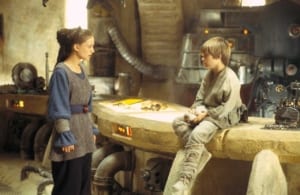
Gretchen: Also, Padmé/Anakin. Natalie Portman doesn’t actually look 14 because she’s not. She’s 19, and there’s a huge difference in look between a 14 and a 19 year old. I was really squicked out with the romantic undertones to her and Anakin’s interactions the first time through and I still am. Because Natalie Portman looks way too old to be having a romantic vibe with a 9 year old. And the undertones are there. “I care for you” means something different from “I care about you”. The former is a phrase you only ever hear in romantic contexts, and that’s just…weird since Padmé looks 20 and Anakin only 9.
Zach: Yeah the age gap is pretty squicky, especially when you consider that this means she and Anakin get married at 24 and 19, respectively. It just seems weird that a 14 year old would have ANY romantic feelings about a 9 year old. I guess she has future-vision and knows he will grow up to look like Hayden Christensen.
Gretchen: That might explain it.
Ian: I’m going to double down on my assertion that if we get an older kid to play Anakin a lot of the problems with him go away. Maybe the writing isn’t stellar, but someone with some chops could at least try and sell it better, and then the age gap isn’t so squicky.
Gretchen: Agreed. The sound was mercurial, too. I had to turn up some sections and turn down others. Someone on the sound editing team needed to scale way back on the loudness of the fight scenes.
Zach: OK, I thought that was just me! Then again that seems to be a trend in most modern movies, especially if you listen to them through speakers. Headphones seem to mitigate the problem.
Gretchen: I’m going to disagree with Zach and say the podracing scene was way, way too long. Over 12 minutes of people flying in circles? They could have cut half of it and made it far more interesting. So many of the shots were the same.
Ian: Agreed. Action scenes are all well and good, but this was pretty indulgent.
Gretchen: This is the film that sealed my discomfort with how droids are treated in the Star Wars franchise, and that still applies. They’re very much depicted as being sentient: they joke around, they have emotions, they have snark. At the same time, we’re not supposed to care when they’re destroyed in droves or just shut down. I don’t think it’s intentional, but it’s uncomfortable. Especially the way Anakin programs C-3PO to call him ‘master’ and then casually abandons him on Tatooine.
Ian: …and speaking of 3PO, why… why do we need to have him built by Anakin? This is so obviously shoehorned in for unnecessary fanservice, and it makes no sense. What does Shmi Skywalker need with a protocol droid? Why, if Anakin is so brilliant, is he building an exact model of the protocol droid we saw in the opening scenes of the film? There are so many things wrong with this.
Gretchen: RIGHT. Anakin being C-3PO’s creator is one of the weirdest fanservice moments in the franchise.
Zach: Same tbh. It would have made more sense if he was one of Padmé’s droids or owned by the Senate or something. It just seems a bit bogus that a kid on the Outer Rim just happens to have this super-advanced protocol droid, even if he is broken. I mean, maybe C-3PO’s original, wealthy owner crashed on Tatooine and was killed by the Hutts? Maybe he was a Hutt droid to begin with? Maybe I’m reading way too much into this?
Gretchen: “Reading way too much into things” is kind of my life. One thing I refuse to read too much into? Everything to do with midi-chlorians, Anakin’s Virgin Birth, and the prophecy.
Ian: I just pretend it’s not there and whistle past it.
Zach: Star Wars: The Clone Wars actually retcons the midichlorians. During a Force vision Yoda encounters some funky priestesses who tell him “ … what your science calls midi-chlorians …” so I guess midi-chlorians are just a poor understanding of the Force.
Gretchen: I approve of this creative decision.
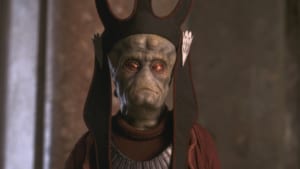
Ian: How about the fact that the blockade has doomed Naboo to a slow death? Naboo is a lush green planet with lots of livestock and oceans. It seems very earthlike. Here on Earth, we’ve managed to do pretty OK without intergalactic trade so far. Maybe there are no mineable metal ores on Naboo, and so they can’t build ships or something. That hardly seems life-threatening. At worst, the blockade is an inconvenience. The senate wants to send a committee? Fine. Send your committee. I’m not signing crap until they deliberate. Keep your dumb blockade for as long as you can afford to have your doughnut ships sitting there doing nothing. Seems pretty expensive. How much is it costing you to keep those things running? Meanwhile, nobody is trading with us and you’re not making squat. Have fun.
Zach: Any scene involving politics. As Kylie has pointed out, the politics of Star Wars plays fast and loose with the whole “making sense” thing. Padmé is tired of Chancellor Valorum, her ally, following the rules of the assembly, so she calls for a Vote of No Confidence to have him removed and that just flies? Also, if the Senate ratifies everything at a glacial pace, why do they elect a new Chancellor so quickly? Removing the executive head of an elected body rarely streamlines the process. In the end, it does not even matter, as Padmé and Co. sneak back to Naboo without Senatorial approval anyway.
Ian: Which they didn’t need to do because no one was in actual danger.
Gretchen: Well, the Trade Federation was threatening to starve the population, even if they didn’t actually do it. I can see why Padmé went back. But the rest of the politics don’t make much sense unless you squint.
Zach: The Plot needed one or two more drafts to streamline it. Too much happens in too little time, and all the plot points seem rushed and a bit ham-fisted. For example, almost everything that happens on Coruscant could have been left out and just relayed through messages, even the Jedi Council stuff.
Ian: It is awfully talky through the second and into the third act, which wouldn’t be so bad if anything that anyone said made a lick of sense. That said, when things are moving, they are moving pretty well. It doesn’t nearly reach the levels of boring that we will experience over the next two months.
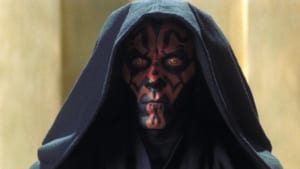
Zach: WHY DID YOU KILL DARTH MAUL!? He had an awesome design and is a physical threat as compared to Palpatine’s cerebral threat. He should have been the badass enforcer in the same way that Darth Vader was. Maybe throw in some lines by Palpatine that he is not an “ideal” apprentice or something to make it credible that Palpatine would dispose of him so readily by Revenge of the Sith. Having a single villain across the series would tie the whole thing together and give us more emotional investment in the story. Then again, if he had survived we might not have gotten his awesome role in The Clone Wars and Rebels.
Ian: Oh man… at the risk of this section dragging to long, I have some thoughts on Darth Maul. Strap in. The Phantom Menace makes way more sense as a title if Palpatine is not the one pulling the Federation’s strings. Have Darth Maul be the one pushing the Federation around and manipulating the invasion, with vague threats about “My master wouldn’t like that” or “You wouldn’t want my master to get involved”.
Meanwhile, Palps does his thing in the senate, and then maybe… MAYBE it’s a surprise later when it turns out he was evil all along. No cutaway scenes with Maul and Sidious. Then we really have a “phantom menace”. Who is Maul’s master? What does he want? How dangerous of a person could have MAUL reporting to him? Then Yoda’s “always are there two” speech at the end has so much more weight, and Palp’s scheming isn’t obvious from the beginning. Then, to Zack’s point, the arrogant, deluded Jedi can continue to focus on Maul over the next film and into the third before the emperor’s grand scheme is finally revealed.
Gretchen: SOLD. Plus, Palp’s voice is so distinctive, how does anyone in the Trade Federation not realize who it is?
Overall Thoughts
Gretchen: I enjoyed it much more than I expected! I may seem like I have a lot of nitpicks, but it was overall an enjoyable movie. Not the best Star Wars movie ever made, but much less terrible than I expected it to be.
I appreciate that I could understand everything happening on the screen without recourse to extended canon materials. It’s a complete story with minimal plot holes. I would have loved more backstory on where the Sith had disappeared to and why Maul wants revenge, but it stands just fine as is. Maybe this is something covered in the novelization/EU? Still, it didn’t bother me enough to hinder my enjoyment.
The characters are a mixed bag of fascinating, fine, and flat out awful. Three cheers for Padmé and her handmaids! Honestly, there was much less action than I remembered, and I liked that. I liked most of the visuals and worldbuilding a lot, but I wish the writing lived up to them. It’s an enjoyable movie that could have been significantly better, but also could have been significantly worse, especially with what comes after.
Zach: The Phantom Menace is a mess of what could have been a great movie but it fell utterly short. The plot was cobbled together, the characters, while interesting, were not developed, and neither they nor the themes were not enough to carry the movie all alone.
The visual splendor is beyond reproach, and those characters we get are still compelling. This movie does a pretty good job of laying the groundwork for Anakin Skywalker’s eventual transformation into Darth Vader. Qui-Gon Jinn is entertaining to watch and his interactions with Obi-Wan serve to set up both of their characters. Of course any scene with Ewan McGregor as Obi-Wan Kenobi is a good scene, and the same can be said of Ian McDiarmid as Palpatine.
The plot really just needed some trimming. Most of the political scenes could have been left out, and if the story had been kept focused only on Naboo and Tatooine the flow would have been greatly improved.
Ian: Like Gretchen, I was surprised how much I enjoyed this. It’s been a number of years since I decided that this film was a disposable and unnecessary part of the saga, but this time around, it seemed fun and vibrant even if a little scatterbrained and weird.
It’s a feast for the eyes, and Lucas’s production team really took some chances with their visual storytelling. There is a lot of fun action and some of the humor lands, but not much. The characters are mostly forgettable, which is unfortunate. That said, I want to second Gretchen’s call for handmaid comics. I will buy those as well. If anyone from Marvel is reading this, make it happen.
Despite the strong visuals and exciting action setpieces, it is difficult to look past the movie’s flaws, (of which there are many) but at this point, with it fresh in my mind, I feel like it’s the best of the new trilogy. We’ll see how that holds up as we go forward.
Gretchen’s Score: 6 – Good: Very watchable and with enough honeypotting it can be considered great. Leaves the viewer with a smile and a desire to see more.
Zach’s Score: 4 – Watchable: If you are bored, give it a looksee. Does not leave the viewer with any significant emotions other than sadness that there was nothing better to do. (I give it a lower score because yes the honeypotting does make it better but it takes a LOT of honeypotting)
Ian’s Score: 5 – Average: It was not bad, it was not good, it was just mediocre. Will leave the viewer feeling ambivalent. The Bendu rating.
Please join us again next month as we fight our way out of a Geonosian droid factory with Attack of the Clones! Wait, is that really the title? It is? Huh…

